September 5, 2025 Friday India This Week 1 A We e kl y N e w s p a p e r Fe a tu r i ng New s an d Tren d s f ro m the In d ian Sub- Co n tinent Pub li s h ed From th e U S Ca pi ta l Web Site: WWW.Indiathisweek.us Volume 34 No. 36 Washington DC. Phone: 301-445-0200; 301-917-4800; 01-445-1868 E-Mail: indiathisweekads@gmail.com Friday September 5, 2025 At Tianjing Summit, India other SCO member countries commit to collaborate on AI Tianjing [China], September 1 (ANI): India on Monday joined other member states of the Shanghai Cooperation Organisation to deepen cooperation in the field of Artificial Intelligence, highlighting the strategic importance of the emerging technology in transforming societies and economies. The Tianjin Declaration of the SCO Council of Heads of States, which was signed and adopted at the 2025 Shanghai Cooperation Organisation Summit today, outlines commitments among member states on Artificial Intelligence, among other areas. The SCO grouping has 10 member states, two observer states, and 14 dialogue partners. Prime Minister Narendra Modi, in his address to the plenary session of the SCO Summit today, flagged emerging threats, including cyber-terrorism, stressing that regional security strategies must evolve to meet new challenges. “It is a matter of great satisfaction that the SCO is evolving with time. Four new centres are being established to address contemporary challenges such as organized crime, drug trafficking, and cybersecurity. We welcome this reform-oriented approach,” the Prime Minister said. Earlier this year PM Modi, in his opening address at the AI Action Summit in Paris, which he co-chaired, touched upon the positive potential of AI and cautioned about its biases. Pointing out that AI is already re-shaping polity, economy, security, and even society, Prime Minister Modi stressed the need for collective global efforts to establish governance and standards that uphold shared values, address risks, and build trust. India is rapidly developing a robust AI computing and semiconductor infrastructure to support its expanding digital economy. With the approval of the IndiaAI Mission in 2024, the government allocated Rs 10,300 crore over five years to strengthen AI capabilities. The Tianjin Dec- laration, building on the UN General Assembly Resolution on Strengthening International Cooperation in the Field of Artificial Intelligence Capacity Building, emphasised that “all countries have equal rights to develop and use artificial intelligence.” SCO Meeting see page 6 Modi, Xi Stress Importance of Stable India-China Relations for Regional and Global Prosperity Tianjin [China]: Prime Minister Narendra Modi and Chinese President Xi Jinping emphasized the strategic importance of stable and friendly India-China relations during their bilateral meeting on the sidelines of the Shanghai Cooperation Organisation (SCO) Summit in Tianjin, underscoring their shared responsibility as two ancient civilizations and major economies to foster peace, stability, and prosperity in Asia and beyond. In a written interview with The Yomiuri Shimbun prior to his visit, Prime Minister Modi described his trip to China as a reflection of the “steady and positive progress” in bilateral ties since his meeting with President Xi in Kazan last year. He stressed that amicable relations be- tween India and China, as the world’s two most populous nations, would significantly impact regional and global prosperity. “Stable, predictable, and amicable bilateral relations between India and China can have a positive impact on regional and global peace and prosperity,” Modi stated. He further highlighted the need for both countries to work together to bring stability to the world economic order, given current global volatility. “India is ready to advance bilateral relations from a strategic and long-term perspective on the basis of mutual respect, mutual interest, and mutual sensitivity,” he added. President Xi Jinping, in his opening remarks during the delega- Remember: “Jesus saith unto him, I am the way, the truth, and the life: no man cometh unto the Father, but by me.” Jesus Christ tion-level talks with Modi, echoed similar sentiments, urging that “the dragon and the elephant dance together.” He emphasized that in a world undergoing “oncein-a-century transformations,” it was the “right choice” for China and India to be friends, maintain good-neighborly ties, and act as partners enabling each other’s success. “The international situation is both fluid and chaotic. China and India, as two ancient civilizations and important members of the Global South, shoulder the historic responsibility of improving the well-being of our peoples, promoting solidarity among developing countries, and advancing human pro- gress,” Xi said. Marking the 75th anniversary of China-India diplomatic ties this year, Xi stressed that both sides must approach their relationship from a strategic height and long-term perspective to ensure “sustained, sound, and steady development.” He also underscored the need for cooperation in upholding multilateralism, building a multipolar world, and promoting greater democracy in international relations. Prime Minister Modi, in response, thanked President Xi for the warm welcome and recalled the “very productive discussions” in Kazan that had given a positive direction to bilateral ties. He noted that “after the disengagement at the border, an atmosphere of peace and stability is now in place,” and pointed to agreements reached by Special Representatives on border management. He further welcomed the resumption of the Kailash Mansarovar Yatra and the restoration of direct flights between the two countries. “Our cooperation is linked to the interests of 2.8 billion people of our two countries. This will also pave the way for the welfare of all humanity. We are committed to advancing our relations based on mutual trust, respect, and sensitivity,” Modi affirmed. Earlier, Modi had traveled from Tokyo— where he attended the 15th India-Japan Annual Summit—before arriving in Tianjin for the SCO Summit at the invitation of President Xi. In his departure statement, Modi highlighted India’s active and constructive role in the SCO, noting its initiatives in innovation, health, and cultural exchanges during its presidency. Upon his arrival in China, the Prime Minister was welcomed with a cultural program featuring Indian classical music and dance, symbolizing goodwill and friendship between the two nations. During his stay, Modi is scheduled to hold significant bilateral meetings not only with President Xi but also with Russian President Vladimir Putin. The SCO currently comprises 10 members: India, Belarus, China, Iran, Kazakhstan, Kyrgyzstan, Pakistan, Russia, Tajikistan, and Uzbekistan, alongside several dialogue partners and observers.

September 5, 2025 Friday India This Week PM Modi Highlights India’s Vision for SCO: Security, Connectivity, Opportunity Tianjin [China], September 1 (ANI): Prime Minister Narendra Modi emphasized that India’s vision for the Shanghai Cooperation Organisation (SCO) is guided by three pillars: Security, Connectivity, and Opportunity. He underscored the importance of security, peace, and stability for national growth, highlighted India’s connectivity initiatives for Afghanistan and Central Asia, and proposed the creation of a Civilisational Dialogue Forum to showcase the cultural heritage of SCO member countries. Addressing the 25th meeting of the Council of Heads of State of the SCO in Tianjin, PM Modi said, “As an active and committed member of the Shanghai Cooperation Organisation (SCO), India has consistently played a constructive and positive role in advancing the organisation’s objectives. India’s engagement within the SCO framework is guided by three key pillars: S – Security, C – Connectivity, and O – Opportunity.” On the security front, he stressed that peace and stability form the foundation for a nation’s progress. “Achieving these goals is often hindered by significant challenges, such as terrorism and separatism. Terrorism is not merely a threat to the security of individual states but a grave challenge to humanity as a whole.” He referred to the recent Pahalgam terror attack, saying, “India has been bearing the brunt of terrorism for the last four decades. Recently, we saw the worst side of terrorism in Pahalgam. I express my gratitude to the friendly countries that stood with us in this hour of grief.” Regarding connectivity, PM Modi highlighted key projects, stating, “India has always believed that strong connectivity not only boosts trade but also opens doors to growth and trust. With this in mind, we are working on initiatives like the Chabahar Port and the International NorthSouth Transport Corridor. This will help us improve connectivity with Afghanistan and Central Asia.” On the pillar of opportunity, he noted that India’s SCO presidency in 2023 brought new areas of cooperation, including startups, innovation, youth empowerment, digital inclusion, and shared Buddhist heritage. “Our effort was to expand SCO’s ambit beyond governments,” PM Modi said. He also suggested establishing a Civilisational Dialogue Forum to share India’s ancient civili- zations, arts, literature, and traditions with the world. Earlier, PM Modi, President Vladimir Putin, and President Xi Jinping shared a light moment before the plenary session. PM Modi will later hold a bilateral meeting with Putin. On Sunday, he held talks with Xi Jinping, during which both leaders reaffirmed that India and China are development partners, not rivals, and emphasized the need for stable, cooperative relations based on mutual respect, interest, and sensitivity. The SCO Summit this year is taking place in the port city of Tianjin. In addition to India, the SCO comprises Belarus, China, Iran, Kazakhstan, Kyrgyzstan, Pakistan, Russia, Tajikistan, and Uzbekistan, along with several dialogue partners and observers. India has been a member Made-in-India Drones Will Be Undetectable by US, Chinese Systems: Rajnath Singh Noida (Uttar Pradesh) [India], August 30 (ANI): Defence Minister Rajnath Singh praised the young workforce at Raphe mPhibr Pvt. Ltd in Noida on Saturday, highlighting their role in advancing India’s defence sector. He assured that drones manufactured at the facility would be undetectable by systems developed by either the United States or China. Singh, along with Uttar Pradesh Chief Minister Yogi Adityanath, inaugurated the defence equipment and drone manufacturing unit at the facility on Sunday. Speaking at the event, the Defence Minister said, “The youth here are playing a pivotal role in the creation of an Atmanirbhar Bharat. Drones made in India will not be detectable by any systems developed in the US or China. The country’s innovation and indigenous designs are advancing to new heights. This plant, which began with just 10 people in 2017, now employs over 600 scientists and engineers, making it one of India’s most innovative aircraft manu- facturing companies. Over 5,000 jobs will be created here.” Singh also commended the Noida unit for developing India’s largest aero engine test bed, which has been dedicated to national service. He noted that Noida is playing a crucial role in housing significant innovations, from start-ups to high-tech manufacturing units. “I had the opportunity to visit a plant here and observed state-of-theart facilities, such as the engine test bed, metal additive manufacturing capabilities, furnaces that can reach 2,800 degrees Celsius, an advanced composite polymer manufacturing center, and precision-guided missile drones. These highly advanced and reliable technologies will significantly enhance India’s defence capabilities,” Singh said. The Minister reflected on the progress made in Uttar Pradesh, noting the state’s improved Ease of Doing Business environment, which was once hindered by weak law and order. Singh also high- lighted the growing global reliance on drones in defence, citing their use in the Russia-Ukraine conflict. “Drones are now being used in places where large equipment cannot reach. Initially used for surveillance, drones have evolved into tools for combat in border conflicts,” he explained. He added, “Countries that have invested in drone technology have gained a significant lead in this field. On the other hand, many countries have been left behind in this race. But today, the reality of the world of defence rests solely on aircraft technology and drones. It is a matter of great joy for all of us that India is also moving rapidly forward in this direction. Earlier, we had to import drones from outside, but today we are designing, developing, and manufacturing them ourselves. In this progress of ours, many entrepreneurs have made a very important contribution.” (ANI) since 2017, having been an observer since 2005. During its membership, India has chaired the SCO Council of Heads of Government in 2020 and the SCO Council of Heads of State from 2022 to 2023, articulating priorities focused on security, economic development, connectivity, unity, respect for sovereignty, territorial integrity, and environmental protection. India’s presidency of the SCO in 2022–2023 also introduced five new verticals—startups and innovation, traditional medicine, science and technology, youth empowerment, and shared Buddhist heritage—opening new avenues to enrich the organization’s agenda. (ANI) Deepak Mittal appointed as next Ambassador of India to UAE New Delhi [India], Septmeber 2 (ANI): The Ministry of External Affairs has appointed Deepak Mittal as the next Ambassador of India to the United Arab Emirates. The IFS officer from the 1998 batch has previously served as India‘s Ambassador to Qatar. He played a key role in establishing the first formal diplomatic contact between India and the Taliban after the withdrawal of US troops from Afghanistan. Deepak Mittal met Sher Mohammad Abbas Stanekzai, then head of the Taliban‘s Political Office in Doha, in 2021. Deepak Mittal will replace Sunjay Sudhir, who has been serving as India‘s Ambassador to the UAE since 2021. India diplomatic relations with UAE were established in 1972. Over the years, they have grown significantly and gained new momentum after PM Modi’s visit in 2015, the first by an Indian PM in over three decades. PM Modi visited UAE in 2015, which marked the beginning of a new Comprehensive and Strategic partnership between the two countries. This was followed by five other visits of PM in the last 8 years, most recently in Nov-Dec 2023 to attend COP28-World Climate Action Summit in Dubai, according to MEA. From the UAE, there have been multiple visits by the President Sheikh Mohamed bin Zayed (MBZ). In 2016 and 2017, he visited as Crown Prince of Abu Dhabi. In Sep 2023, he visited India as the President of the UAE to attend the G20 Leaders’ Summit. In Nov 2023, President MBZ participated in the 2nd Virtual Global South Summit. In Jan 2024, he visited Gujarat to attend the 10th Vibrant Gujarat Global Summit as the Chief Guest.
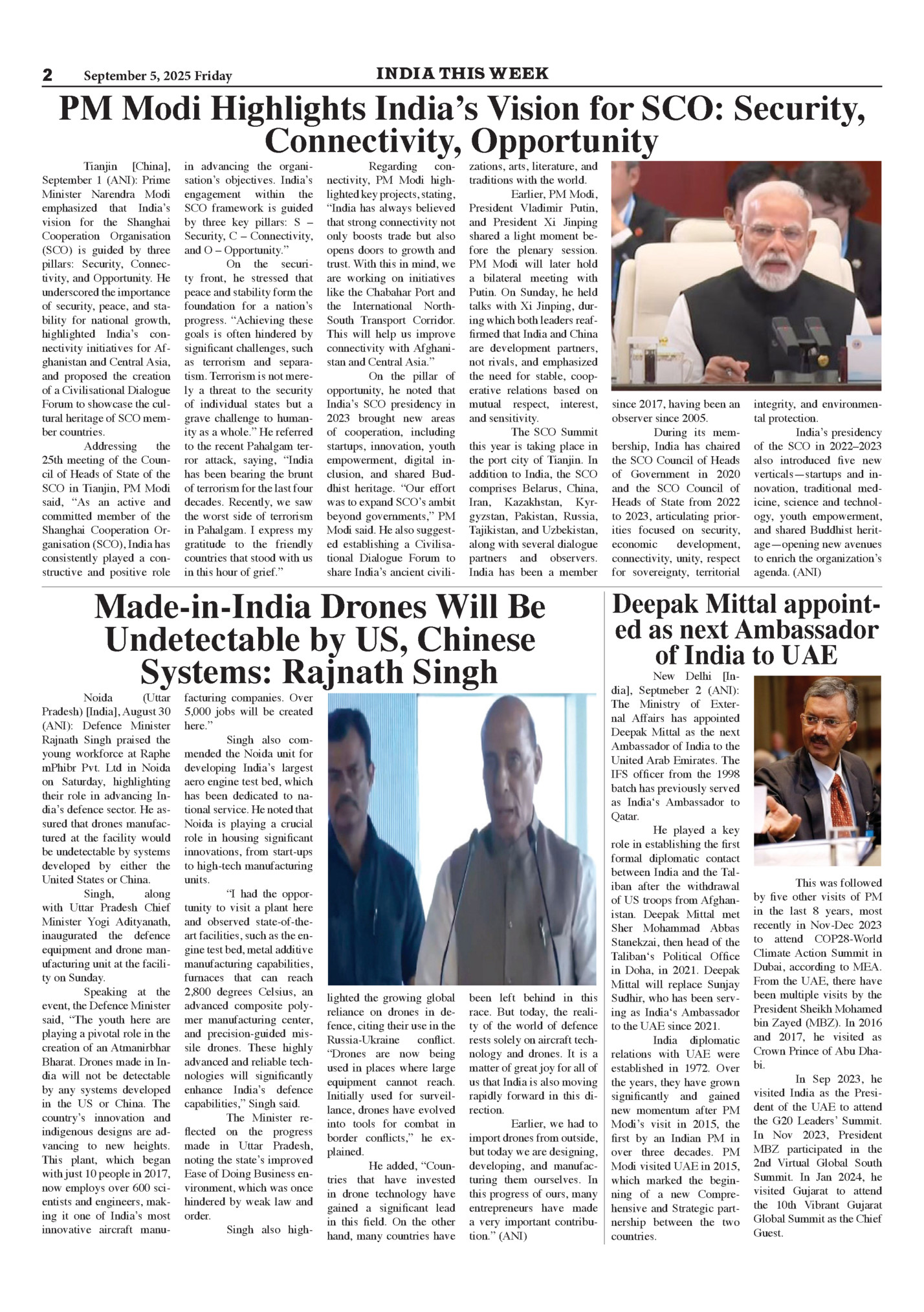
September 5, 2025 Friday 3

India This Week September 5, 2025 Friday SASDAC Celebrates Family Life Ministry Weekend with a Focus on Mental Health and Family Wellness By Dr. Neena And Joseph Eapen, Directors For Family Life Ministry At Sasdac. Silver Spring, MD – The Southern Asia Seventh-day Adventist Church (SASDAC) recently celebrated its Family Life Ministry Weekend on August 22 and 23 with a strong focus on emotional well-being, strengthening of family bonds, and mental health. The event was held under the leadership of Mr. Joseph Eapen and Dr. Neena Eapen, who have long dedicated their efforts to enriching family life through programs that engage young adults, parents, and couples alike. Recognized by the General Conference of Seventh-day Adventists as a core ministry of the church, Family Life Ministry plays a critical role in building spiritually and emotionally healthy families. SASDAC’s pastoral team under the leadership of Pr. John Daniel and the Family Life Ministry team is committed to this vision and this was evident throughout the weekend’s events. The featured speaker for the weekend was Dr. Thomas Idiculla, a psychiatry instructor at Harvard Medical School, researcher, counselor, and President of Agape Ministries International. Dr. Idiculla delivered a powerful message on the theme: “Race, Grace and the Space from the Biblical Perspective on Friday evening. On Saturday afternoon, Dr. Idiculla emphasized several foundational elements essential for a healthy and thriving family life. These included building on a solid foundation, having clear direction, maintaining a biblical worldview, fostering mari- tal intimacy, sharing a powerful message, engaging in effective communication, offering unconditional love, practicing purposeful parenting, and holding onto the blessed hope. Dr. Idiculla also presented sobering statistics on the challenges facing families today, particularly from 1960 to 2020—including drug use, abortion, divorce, depression, the influence of the internet, changing views on marriage and gender, and the long-term effects of the COVID-19 pandemic. These, he noted, are key stressors especially affecting youth and families. S i g n i f i c a n t l y, the event also highlighted the often unspoken mental health struggles within South Asian communities. Mr. Joseph Eapen during his vote of thanks called for an end to the stigma and taboo surrounding mental illness and family conflict. “It’s time we break the silence,” he urged, advocating for early professional intervention before crisis escalates. He also encouraged the formation of community support groups to provide safe, non-judg- mental spaces for individuals and families seeking help and guidance. More than 100 people from all ages attended the weekend program, many leaving with a renewed commitment to improving their relationships and nurturing a supportive environment in their homes. The SASDAC Family Life Ministry continues to offer resources and support for families, affirming the church’s mission to promote spiritual, emotional, and relational health in the community. India Leapfrogging Rest of World in Critical Wireless Technologies, Semiconductor Design: Sinclair President Ripley Ahead of Semicon India 2025 Washington DC [US], September 1 (ANI): India is outpacing the rest of the world in critical wireless technologies and semiconductor design, driving innovation and new products, Chris Ripley, President and CEO of Sinclair, said ahead of Semicon India 2025, India’s flagship semiconductor-focused event, beginning tomorrow. Ripley highlighted India’s expertise in semiconductor design, noting significant investments in the country to produce next-generation wireless technologies. “We recognized that the expertise available in India was second to none in the world. We’ve invested heavily in India to produce next-generation wireless technologies like what I have in my hand here. This tablet is powered by a D2M chip, designed in India. It’s a great example of how India is leapfrogging the rest of the world in critical wireless technologies and semiconductor design, and driving innovation and new products in the US and globally,” he said. Sinclair is one of the largest US news media companies. Prime Minister Narendra Modi will inaugurate Semicon India 2025 on Tuesday at Yashobhoomi in New Delhi and will also participate in a CEOs roundtable. The three-day conference, running from September 2 to 4, will focus on building a robust, resilient, and sustainable semiconductor ecosystem in India. Sessions will cover the progress of the Semicon India Programme, semiconductor fab and advanced packaging projects, infrastructure readiness, smart manufacturing, innovations in R&D and artificial intelligence, investment opportunities, and state-level policy implementation. The event will showcase initiatives under the Design Linked Incentive (DLI) scheme, the growth of the startup ecosystem, international cooperation, and the future roadmap for India’s semiconductor sector. Over 20,750 attendees are expected, including more than 2,500 delegates from over 48 countries, over 150 speakers—including more than 50 global leaders— and more than 350 exhibitors. The event will also feature six countries roundtable discussions, country pavilions, and dedicated pavilions for workforce development and startups. Semicon conferences worldwide aim to maximize the outreach of technological advancements in the semiconductor domain and the poli- cies of various countries to strengthen their semiconductor ecosystem. Furthering Prime Minister Modi’s vision to position India as a hub for semiconductor design, manufacturing, and technology development, previous conferences were held in Bengaluru in 2022, Gandhinagar in 2023, and Greater Noida in 2024.
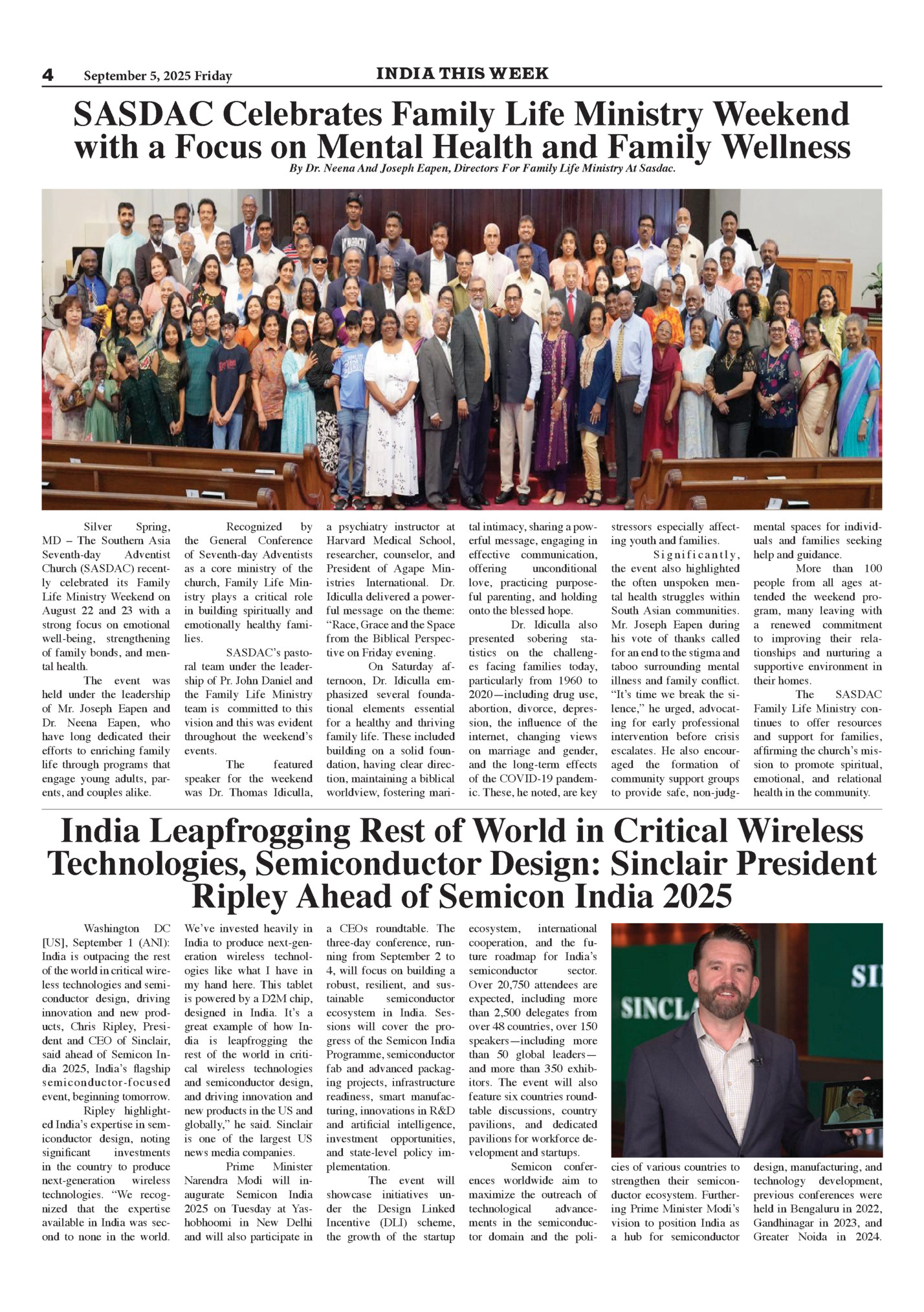
September 5, 2025 Friday 5

September 5, 2025 Friday India This Week At Tianjing Summit, India other SCO member countries commit to collaborate on AI SCO Meetings From Page 1 The SCO member countries, which includes India, expressed their readiness to work together to prevent risks in order to continuously improve the security, accountability, reliability, transparency, inclusiveness, trustworthiness, and fairness of artificial intelligence technologies for the benefit of all humanity. In this regard, they advocated for the implementation of the Roadmap for the Implementation of the SCO Member States’ Cooperation Programme on Artificial Intelligence Development (Chengdu, 12 June 2025). SCO Member states welcomed the UN General Assembly Resolution, “The role of artificial intelligence in creating new opportunities for sustainable development in Central Asia” of July 25, 2025, which notes the initiative to establish a Regional Artificial Intelligence Centre in Dushanbe. SCO Member countries noted the proposals to establish mechanisms for cooperation in the field of artificial intelligence, as well as on advanced and breakthrough technologies of the SCO. Chinese President Xi Jinping, in his keynote speech at the Tianjing summit, proposed that SCO member states boost cooperation in a wide range of areas including energy, infrastructure, digital economy, science and tech innovation, and artificial intelligence. Notably, a humanoid AI robot, Xiao He, was deployed to assist media personnel and summit attendees with various tasks at the Tianjin Summit. Xiao He’s presence at the SCO Summit garnered significant attention, with the robot’s humanoid design and advanced capabilities sparking interest and admiration. Meanwhile, prior to his China visit, PM Modi was in Tokyo for the 15th India-Japan Annual Sum- The Poetic Pen INDIA THIS WEEK- AUGUST 15, 2025 Blaming others for your crimes! Why do you scream when others cheat, And call them names for the same crimes you’ve perfected? Why do you believe you should have power To serve the people of your land? If you love the perks that come with power, How can you call yourself a servant of the people You are using politics to further your own ambition, Rather than serving with true devotion. How can your community progress If your eye is set on power, and you genuflect At the command of a donor who can sway you With a penny and impose his demands? Justice demands fair play in every role; Community requires honest players. When honesty is traded for wealth and power, Casting aspersions on others is unfair. There is none perfect; all make mistakes. But the danger lies in reveling in them, And repeating them, seduced by gain, Reaping the crimes one shamelessly commits. Blaming others for the same offenses Is just a mask to hide one’s evil deeds. When power is the only game, losing it Feels like death—life itself becomes worthless. By Rajan George mit in which one of the key outcomes was the launch of the Japan-India Artificial Intelligence Initiative to strengthen bilateral cooperation in AI technologies. The initiative aims to enhance collaboration on large language models, data centres, and AI governance and is expected to drive innovation and research between the two countries. “Cooperation in the area of High Technology is a priority for both of us. In this context, Digital Partnership 2.0 and AI cooperation initiatives are being undertaken,” PM Modi said in Tokyo. PM Modi also invited Japanese Prime Minister Shigeru Ishiba to India’s AI Impact Summit, scheduled for February 2026. “We are living in the age of Artificial Intelligence, and both leaders recognised that AI is a revolutionary technology poised to transform our society and economies. The initiative will strengthen collaboration between In- dia and Japan on AI,” Foreign Secretary Misri said in a media briefing about the PM’s visit to Japan. Last month during the BRICS outreach summit in Brazil, PM Modi called for ensuring responsible governance of Artificial Intelligence. “In the 21st century, the progress and well-being of people largely depends on technology, especially Artificial Intelligence. On one hand, AI can greatly improve everyday life; while on the other hand, it also raises concerns about risks, ethics, and bias,” PM Modi had said. The Prime Minister said that India’s approach and policy on this topic are clear and that it sees AI as a medium to enhance human values and potential. “Working on the mantra of ‘AI for All’, today we’re widely and actively using AI in sectors like agriculture, health, education, governance in India,” the Prime Minister elucidated. INDIA THIS WEEK Phone: 301-445-0200; 301-917-4800 www.indiathisweek.online India This Week is published every Friday by ADV Solutions Inc, Views expressed in this paper are those of the individual writers and not necessarily of India This Week. India This Week accepts no liability for the errors in advertisements or in any of its reports. For remedial actions any errors should be brought to the attention of the editor by the information provided below. Publisher: Dr. Babu Stephen Chief Editor: Rajan George Contributing Editors: Saju Mathew Isaac George Asst. Editors: Manu Jacob Sherena Panjikkaran Special Business Correspondent Elisha B. Pulivarti Business Coordinators Rajan C. George Jithu Johny Panjikkaran Dr. Renuka Misra, Special Correspondent: Geeta Goindi Community Coordinator: Prof. Vinod Goel India Office Manesh Krishna Columnists: Anadi Naik World Religions Dr. Sam Prasad Jillella Photo Journalist: Mathew Karmel, System Admn. & Maintenance: Rajan C. George Layout & Graphics: Prinston Samuel, Business Affairs: Mrs. Molly George CALL US • 301-445-0200 • 301-917-4800 e-Mails: Advertisements: indiathisweekads@gmail.com Press Releases: indiathisweekpress@yahoo.com Web: www.indiathisweek.online Indian refiners’ “signalling” reduction of Russian oil imports, claims US Congressman after visit to India, Pakistan Washington DC [US], September 3 (ANI): Indian refiners are indicating plans to reduce their imports of Russian oil due to “sustained US pressure”, claims US Congressman Brian Fitzpatrick, following a high-level intelligence visit to India, Pakistan, and Nepal. In a release issued on Tuesday (local time), following the conclusion of his two-week mission to South Asia, Fitzpatrick claims that while in India, his delegation engaged in strategic discussions with senior officials, including the External Affairs Minister S Jaishankar and National Security Advisors. He stated that these dialogues, alongside sustained diplomatic engagement, have led to “early signals” from Indian refiners indicating a potential reduction in Russian oil imports amid heightened economic tensions between the two nations following Washington’s imposition of a 50 per cent tariff on Indian imports, which included an additional 25 per cent due to New Delhi’s purchase of Russian crude oil. “Following these engagements and sustained US pressure, Indian refiners are signalling plans to reduce imports of Russian oil—a consequential shift that directly undermines Moscow’s ability to finance its war in Ukraine,” the release read. “In India, our direct engagement helped catalyse early signals that the government will reduce its imports of Russian oil—a meaningful step toward weakening Moscow’s capacity for aggression and aligning our partners with the cause of freedom,” the US Congressman said in a statement issued in the release. Brian Fitzpatrick, who serves as Chairman of the CIA Subcommittee on the House Permanent Select Committee on Intelligence, was joined on the mission by Congresswoman Chrissy Houlahan, also a member of the House Intelligence Committee. The Congressman also conducted oversight visits to the US Embassy in New Delhi, met with diplomatic and security personnel, and visited the BAPS Swaminarayan Sanstha. Beyond India, the congressional delegation travelled to Pakistan, where they engaged in high-level meetings with discussions focused on counterterrorism efforts, intelligence sharing, and long-term regional security cooperation. “In Islamabad, Fitzpatrick held high-level meetings with U.S. Embassy officials and senior U.S. Government personnel, focusing on advancing core U.S. intelligence priorities. He also held strategic meetings with partner nation representatives, including officials from the United Kingdom, Australia, and Ukraine. Remember: “If ye continue in my word, then are ye my disciples indeed; And ye shall know the truth, and the truth shall make you free. ” Jesus Christ
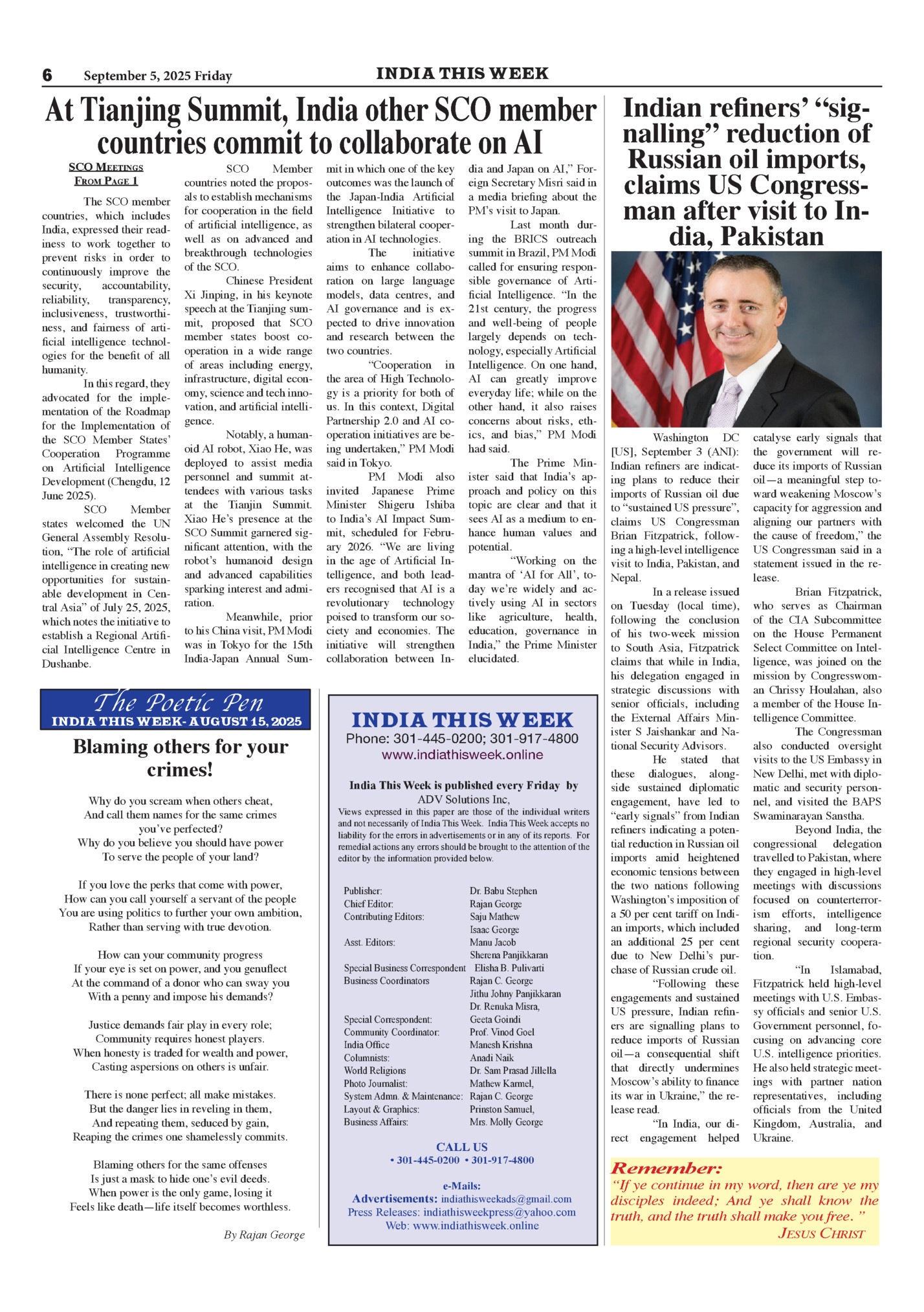
September 5, 2025 Friday 7

September 5, 2025 Friday India This Week For Germany “India equals Asia,” says German Foreign Minister Wadephul; Jaishankar calls for deeper ties amid global changes New Delhi [India], September 3 (ANI): German Foreign Minister Johann Wadephul on Wednesday highlighted India’s growing importance in global politics and trade, declaring that for Germany, “India equals Asia,” while for New Delhi, Germany is equivalent to Europe. Wadephul is on a two-day official visit to India, during which he held bilateral talks with External Affairs Minister S. Jaishankar on trade, security, and global challenges. Addressing a joint press conference, Wadephul said Berlin regards New Delhi as a crucial partner in shaping the global order. “India equals Asia for us, and Germany and the European Union in a way are equivalent for India. India plays a very important part, and though we both have our own political positions and priorities, when it comes to democratic principles and regulatory steps, both our countries and both our markets tend to be very diligent and adherent to certain details,” he said. The German minister emphasised that both sides must do more to ease market access. “Sometimes, we could make it easier for the other side to engage in the respective market, and we’ve underlined that in our discussions today. I think we both have our homework to do in that regard,” he noted. Wadephul also reaffirmed Germany’s support for India in its fight against terrorism, stressing that New Delhi has every right to defend its people. He said both countries share concerns about defending the international rules-based order, particularly in the context of China’s rise. While acknowledging China as a partner in climate protection, he described it also as a competitor and a systemic rival. “We place value on having fair competition and equal rules. But we also see China as a systemic rival—and we don’t want that rivalry,” he said, adding that Germany and its partners must respond to China’s increasing confrontational approach in certain areas. On the Ukraine conflict, Wadephul welcomed Prime Minister Narendra Modi’s recent discussions with Russian President Vladimir Putin during the SCO Summit in Tianjin. He urged India to use its ties with Moscow to push for peace, noting, “Peace is the basis for security, freedom, and prosperity. Security is and will remain a challenge for the future.” The German Foreign Minister also praised India’s technological leadership, pointing to its hosting of the upcoming AI Summit as proof of its ambition to be at the forefront of innovation. He underlined trade as another pillar of ties, noting that with nearly €31 billion in bilateral trade, India is already Germany’s most important partner in South Asia. “We aim to double that,” he said. EAM Jaishankar, in turn, stressed that the sweeping changes in global strategic and economic landscapes make a “very compelling case for a deeper, stronger, wider India-Germany relationship.” He noted, “We are witnessing significant and far-reaching changes on the global strategic landscape, along with volatility on the economic front. Together, they make a very powerful case for India and the European Union—and India and Germany—to work much more closely.” Jaishankar described the India-Germany partnership as “enormous- ly important,” especially amid uncertainties. “This relationship is growing in substance and has greater value at this time. Predictability today has a huge premium in global politics,” he said. The minister added that bilateral trade last year was nearly €50 billion, and assured Wadephul that India shares Germany’s confidence about doubling the volume. He reiterated New Delhi’s commitment to improving ease of doing business and addressing concerns of German companies. Highlighting 50 years of Indo-German scientific collaboration, Jaishankar said the focus now was on linking science to industry and expanding cooperation in cyber, digital, and space domains. He also raised the issue of Ariha Shah, an Indian child in German foster care, stressing the importance of ensuring her cultural rights and upbringing in Indian surroundings. On defence and security ties, Jaishankar pointed out Germany’s participation in the Tarang Shakti air exercises and port calls by its navy, saying both sides agreed to expand such cooperation. He also appreciated Germany’s consistent support for India’s right to defend itself against terrorism. The two leaders exchanged views on regional and global issues, including Ukraine, West Asia, the Middle East, and the Indo-Pacific. Jaishankar said India believes a multipolar world with strategic autonomy can best respond to current challenges through closer consultations and cooperation among key states. “This is a very steady relationship. What we promise to each other and the policies we pursue remain constant and predictable. For us, Germany as the largest EU member is central to our global calculations,” Jaishankar said, welcoming Wadephul on his first visit to India as Foreign Minister. (ANI) Union Cabinet approves Rs 1,500 crore incentive scheme to promote critical mineral recycling in country New Delhi [India], September 3 (ANI): The Union Cabinet, chaired by Prime Minister Narendra Modi, on Wednesday approved a Rs 1,500 crore Incentive Scheme to develop recycling capacity in the country for the separation and production of critical minerals from secondary sources. This scheme is part of the National Critical Mineral Mission (NCMM), which is aimed at building the domestic capacity of and supply chain resilience in critical minerals. The critical mineral value chain, comprising exploration, auction and mine operationalisation, and acquisition of foreign assets, has a gestation period before it can supply critical minerals to the Indian industry. A prudent way to ensure supply chain sustainability in the near term is through the recycling of secondary sources, a Ministry of Mines release said. The Scheme will have a tenure of six years from FY 2025-26 to FY 2030-31. Eligible feedstock is e-waste, Lithium Ion Battery (LIB) scrap, and scrap other than e-waste and LIB scrap e.g. catalytic convertors in end-of-life vehicles. Expected beneficiaries will be both large, established recyclers, as well as small, new recyclers (including start-ups), for whom one-third of the scheme outlay has been earmarked.The Scheme will be applicable to invest- ments in new units as well as expansion of capacity/ modernization and diversification of existing units, the release said. The Scheme will provide an incentive for the recycling value chain, which is involved in the actual extraction of critical minerals, and not the value chain involved in only black mass production. The incentives under the Scheme will comprise 20% Capex subsidy on plant and machinery, equipment and associated utilities for starting production within the specified timeframe, beyond which a reduced subsidy will be applicable; and Opex subsidy, which will be an incentive on incremental sales over the base year (FY 2025- 26), viz. 40% of the eligible Opex subsidy in the second year and the remaining 60% in the fifth year from FY 2026-27 to FY 203031 on achievement of the specified threshold incremental sales. To ensure a greater number of beneficiaries, the total incentive (Capex plus Opex subsidy) per entity will be subject to an overall ceiling of Rs 50 crore for large entities and Rs 25 crore for small entities, within which there will be a ceiling for Opex subsidy of Rs 10 crore and Rs 5 crore, respectively. In terms of key outcomes, the Scheme incentives are expected to develop at least 270 kilo ton of annual recycling capac- ity, resulting in around 40 kilo ton annual critical mineral production, bringing in about Rs . 8,000 crore of investment and creating close to 70,000 direct and indirect jobs.Several rounds of consultations with industry and other stakeholders have been held through dedicated meetings, seminar sessions before formulating the Scheme, the release said. (ANI)
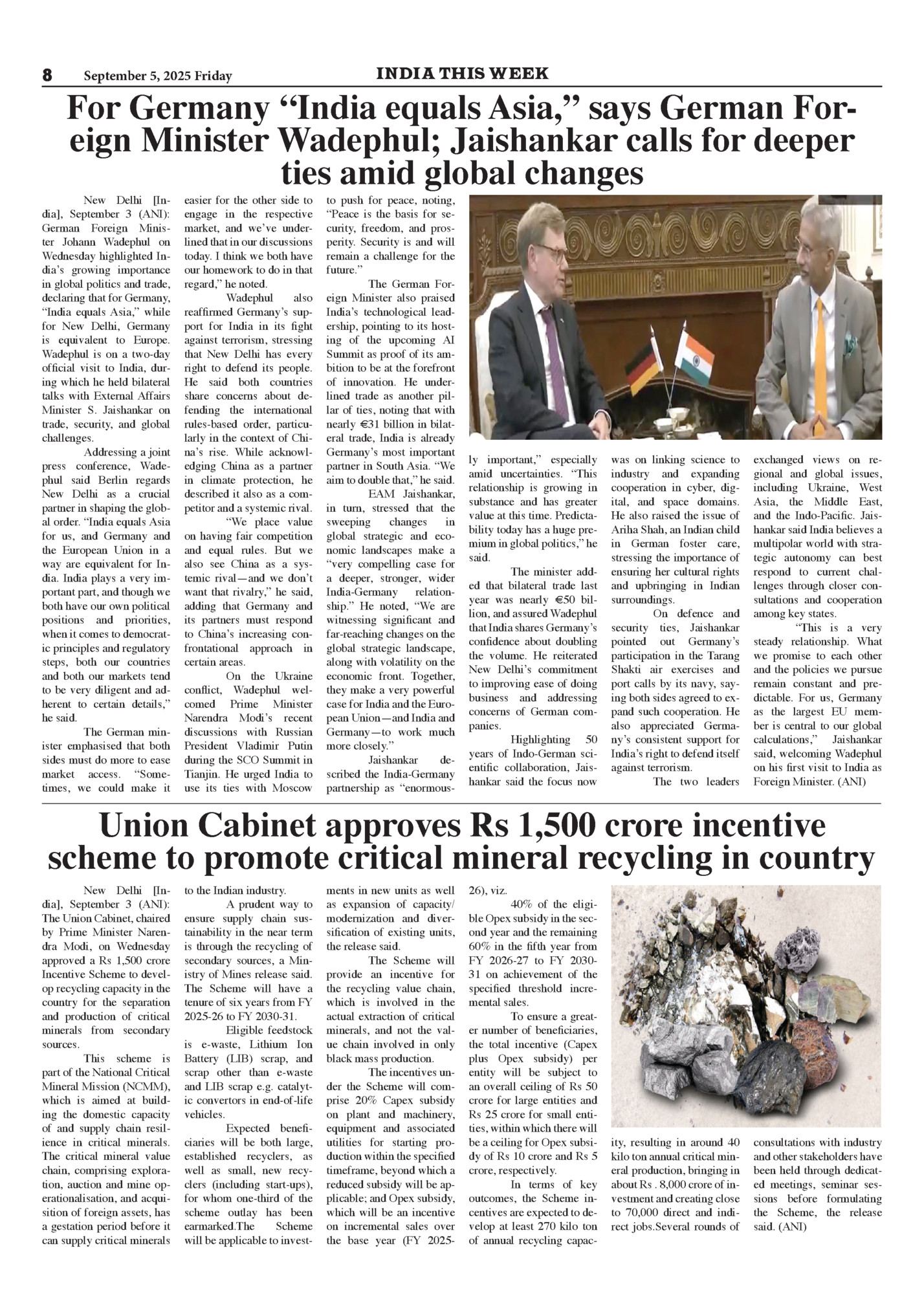
September 5, 2025 Friday Opposition wraps up ‘Voter Adhikaar Yatra’ in Bihar, highlights “disenfranchisement” of voters; BJP hits back New Delhi [India], September 1 (ANI): The ‘Voter Adhikaar Yatra’ that began amid chaos over the allegations of “vote theft” in the assembly elections and alleged disenfranchisement of Bihar voters has come to an end today. The allegations of discrepancies in the Special Intensive Revision (SIR) exercise carried out by the Election Commission (EC) in Bihar ahead of the forthcoming assembly elections were levelled by Leader of Opposition (LoP) Lok Sabha Rahul Gandhi, who pledged that the opposition would not let votes be stolen. However, the Bharatiya Janata Party (BJP) and other leaders in the double-engine government of Bihar have lambasted the opposition, accusing them of “destroying” the Constitution and of allegedly distrusting the country’s democratic processes. The Voter Adhikaar Yatra witnessed massive public rallies in several districts of Bihar – from Sasaram to Siwan. It also witnessed clashes between Congress and BJP workers on Friday (August 29). The BJP racked up another issue, demanding an apology from Rahul Gandhi and his allies over the alleged abuses hurled at Prime Minister Narendra Modi and his late mother during a public rally in Darbhanga. Responding to allegations of the BJP, the INDIA bloc refuted their claims while suggesting that the man who hurled abuses in the rally was associated with the ruling party in the Centre. Congress’s Digvijay Singh and Shiv Sena’s UBT MP Sanjay Raut have both claimed that the accused, whom the police have now arrested, was from the BJP. Earlier in the day, Raut claimed that nobody from the opposition was abusing anyone, instead shifting the blame onto the BJP leaders. “Nobody is abusing anyone. Modi himself started the trend of abusing each other at the national stage in politics. Now, PM Modi and the BJP are scared. Be it Rahul Gandhi or Tejashwi Yadav, show me if anyone abused anyone. I have also followed the Yatra. It is the BJP people who hurl abuses and blame us. It was the BJP workers who entered the crowd,” Raut told ANI. As this happened, Congress MP Rahul Gandhi today told ANI that the slogan “Vote Chor, Gaddi Chhodd” was echoing everywhere. “It has now reached China,” he added. The LoP pledged that the opposition will not let votes be stolen in Bihar ahead of the forthcoming assembly polls, standing firm on his allegations of vote theft. “We pledge – not a single vote will be stolen in Bihar. We will protect democracy and the constitution with all our might,” Gandhi posted on X. Gandhi further extended his gratitude towards prominent opposition leaders from various parties, who are also part of the INDIA bloc, for making the ‘Voter Adhikaar Yatra’ “historic”. “Heartfelt thanks to Lalu Prasad Yadav, Tejashwi Yadav, Dipankar Bhattacharya, Mukesh Sahni, Bihar Congress leadership, the Congress’s Babbar Sher, INDIA workers, and the youth of the state for making the Bihar Voter Adhikaar Yatra historic,” Gandhi said. Gandhi warned the BJP of an impending expose. Referring to his allegations of vote theft, the LoP Lok Sabha stated that he would soon unleash a “hydrogen bomb,” implying that highlighting the alleged irregularities regarding the Mahadevpura assembly constituency was just an “atom bomb.” Addressing a rally in Patna today, Congress chief Mallikarjun Kharge also targeted the double-engine government of the BJP and the Janata Dal United (JDU) in Bihar, and asserted that the Nitish Kumar-led government would be voted out of power within the next six months. “This double-engine government will not be there in the next 6 months. The government that will come will be of the poor, of poor women, of Dalits and backward classes,” Kharge said while addressing a rally on the last day of ‘Voter Adhikaar Yatra’. Meanwhile, Union Textile Minister Giriraj Singh argued that the INDIA bloc will have no standing in Bihar. “INDI alliance will be cleared out from Bihar because of this Yatra. Most of the people in the Yatra were Muslims because they (oppn) served their mission. They invited Revanth Reddy, who abused Bihar. They invited MK Stalin, who abused Hindus. Will Bihar tolerate this disrespect? Hindus are also more (in population). Tejashwi Yadav will suffer a loss,” Singh told ANI. Union Mines Minister G Kishan Reddy also mocked Rahul Gandhi, saying that the LoP was talking about alleged “vote theft” in the assembly elections, since people have refused to give votes to his party. “Rahul Gandhi has got scared of the public, and this is the reason he is talking about vote theft. People are not voting for his party. He doesn’t have faith in people, elections and democracy. If he has courage, he should go among the public and tell about the work done by his party,” Reddy told reporters. Bihar Deputy Chief Minister Vijay Kumar Sinha, in a veiled attack on Rahul Gandhi and Bihar LoP Tejashwi Yadav, labelled them as “appu” and “pappu”, respectively. He accused both opposition leaders of “harming” Sanatani culture and “destroying” democracy. “Both ‘Appu’ and ‘Pappu’, born with a golden spoon, are indulged in the politics of compassion. They respect those who abused Bihar. They are the destroyers of democracy. They also harm our Sanatani culture. They are the biggest dakus (bandits). However, the public will teach them a lesson,” the Bihar Deputy CM told reporters. However, Jan Suraaj Party founder Prashant Kishor criticised both PM Modi and Rahul Gandhi, saying that they didn’t speak about employment opportunities for youth. “We have no interest in the fight between Rahul Gandhi and PM Modi; we are interested that there should be employment in Bihar and migration from Bihar should stop,” Kishor said. The 16-day Yatra, undertaken by Rahul Gandhi to highlight allegations of ‘vote chori’ (vote theft) by the BJP and the alleged irregularities in the revised voter list by the Election Commission of India 9 (ECI), has concluded in Patna today. The rally began on August 18, with Rahul Gandhi and Rashtriya Janata Dal (RJD) leader Tejashwi Yadav riding together in Sasaram. From there, the rally spanned across 25 districts, to Aurangabad, Gayaji, Siwan, and others. Multiple other INDIA bloc leaders have attended the Yatra at various points. Samajwadi Party chief Akhilesh Yadav, CPI(ML) General Secretary Dipankar Bhattacharya, Congress MP Priyanka Gandhi, and Tamil Nadu Chief Minister MK Stalin have joined the rally. Other chief ministers, including Karnataka Chief Minister Siddharamaiah, Himachal Pradesh Chief Minister Sukhvinder Sukhu, and Telangana Chief Minister Revanth Reddy, participated in the Yatra. (ANI) DGCA grants first-ever safety clearance to Air India SATS for ground handling operations New Delhi [India], September 2 (ANI): The Directorate General of Civil Aviation (DGCA) on Monday issued its first-ever safety clearance for ground handling operations to Air India SATS Airport Services Pvt. Ltd. (AISATS), a move seen as a major step in enhancing aviation safety standards in India. According to a statement issued by DGCA, “The Directorate General of Civil Aviation (DGCA) has granted Safety Clearance to Air India SATS Airport Services Pvt. Ltd. (AISATS) for the first time, reinforcing its com- mitment to strengthening Safety Management Systems (SMS) and enhancing regulatory oversight in ground handling operations across India”. The clearance has been issued under the provisions of Civil Aviation Requirements (CAR) Section 4, Series X, Part II. With this, India has become the second country after Malaysia in APAC region to implement such a comprehensive framework in alignment with ICAO guidance, it added.Ground handling is vital to aviation safety, and with increasing traffic, larger aircraft, faster turnarounds, and multiple service providers, DGCA has mandated safety clearance for all operators. AISATS received this clearance after a rigorous evaluation of its Safety Management System, risk controls, reporting mechanisms, training, and infrastructure, confirming full compliance with CAR provisions on Ground Handling and SMS implementation, statement further reads. The regulator added further that Safety Clearance was handed over to AISATS at DGCA Headquarters in New Del- hi, marking a key milestone that underscores DGCA‘s proactive role in embedding Safety Management Systems (SMS) as the foundation of aviation safety and strengthening India’s aviation ecosystem to meet global standards. (ANI)
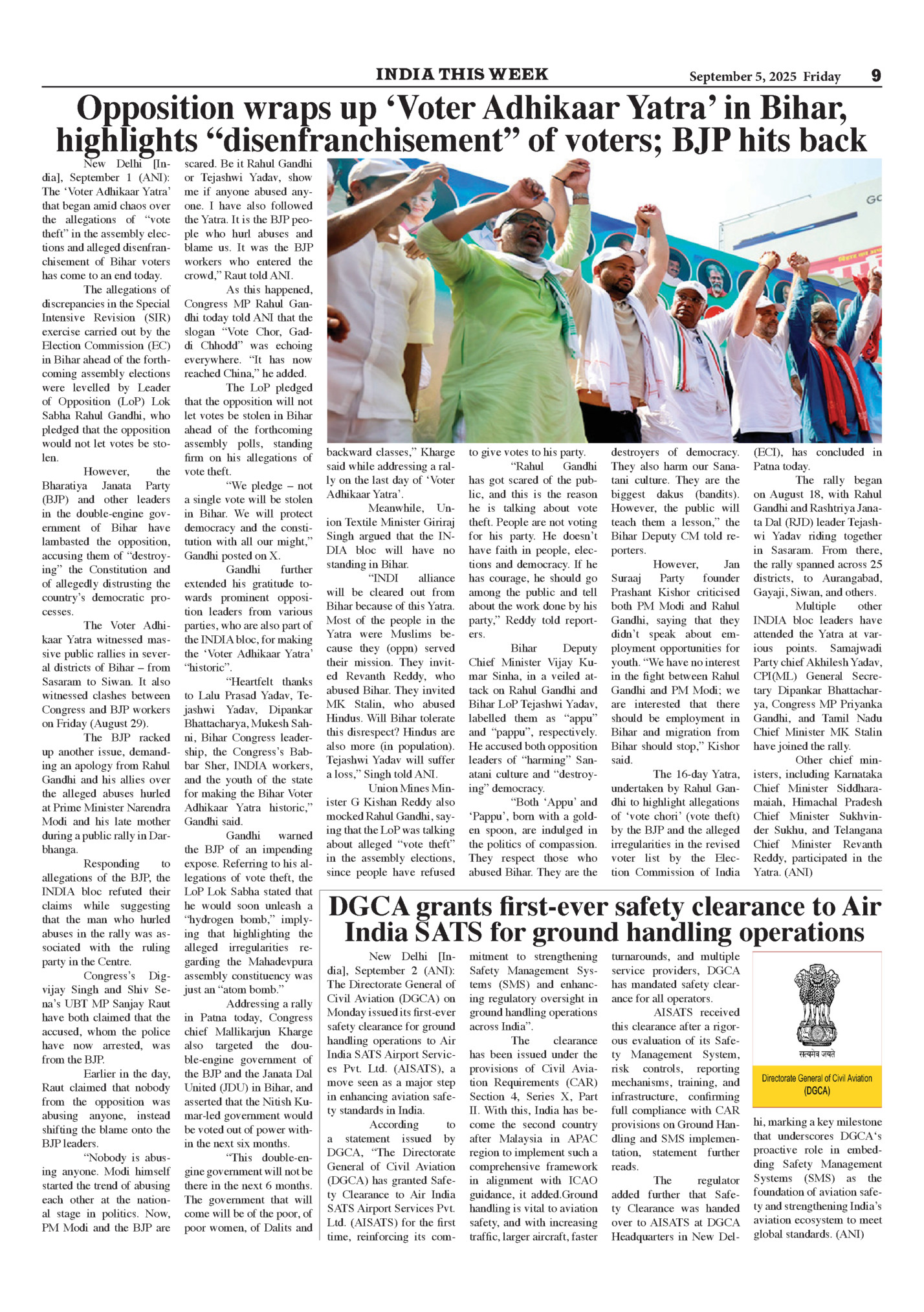
Fleepit Digital © 2021